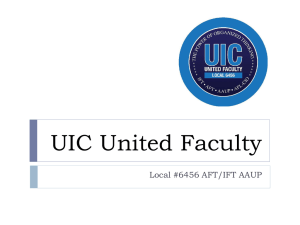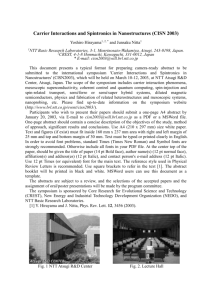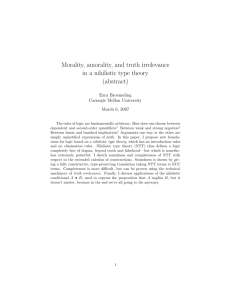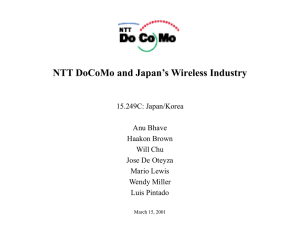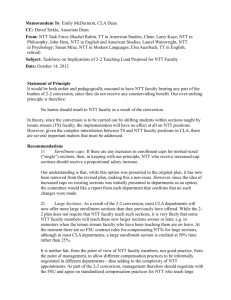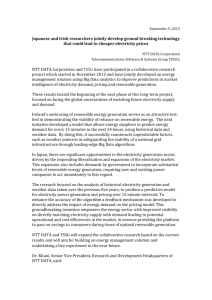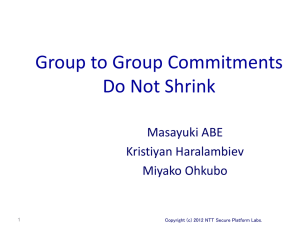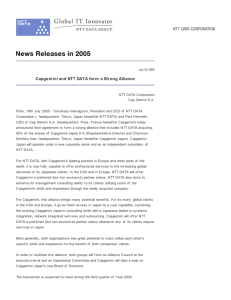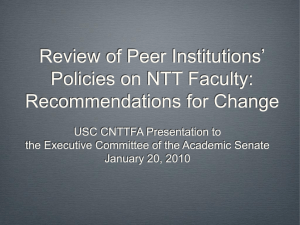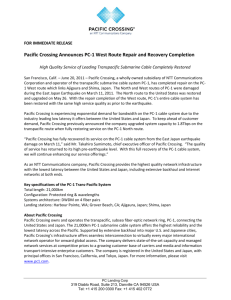Memo to EB propose p..
advertisement
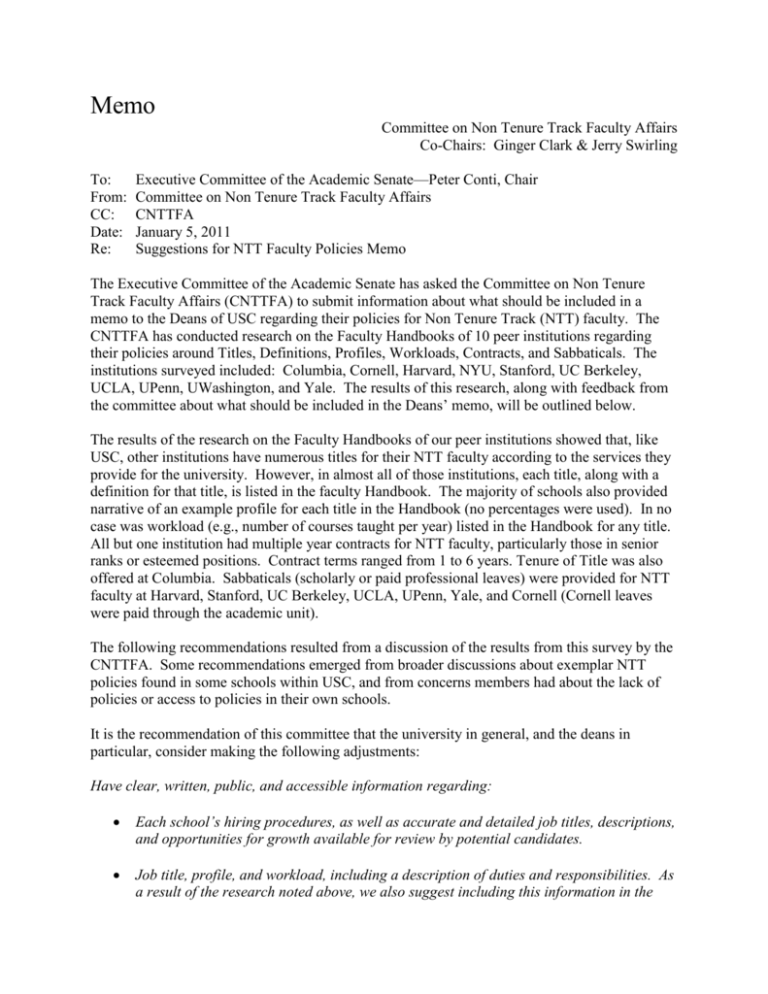
Memo Committee on Non Tenure Track Faculty Affairs Co-Chairs: Ginger Clark & Jerry Swirling To: From: CC: Date: Re: Executive Committee of the Academic Senate—Peter Conti, Chair Committee on Non Tenure Track Faculty Affairs CNTTFA January 5, 2011 Suggestions for NTT Faculty Policies Memo The Executive Committee of the Academic Senate has asked the Committee on Non Tenure Track Faculty Affairs (CNTTFA) to submit information about what should be included in a memo to the Deans of USC regarding their policies for Non Tenure Track (NTT) faculty. The CNTTFA has conducted research on the Faculty Handbooks of 10 peer institutions regarding their policies around Titles, Definitions, Profiles, Workloads, Contracts, and Sabbaticals. The institutions surveyed included: Columbia, Cornell, Harvard, NYU, Stanford, UC Berkeley, UCLA, UPenn, UWashington, and Yale. The results of this research, along with feedback from the committee about what should be included in the Deans’ memo, will be outlined below. The results of the research on the Faculty Handbooks of our peer institutions showed that, like USC, other institutions have numerous titles for their NTT faculty according to the services they provide for the university. However, in almost all of those institutions, each title, along with a definition for that title, is listed in the faculty Handbook. The majority of schools also provided narrative of an example profile for each title in the Handbook (no percentages were used). In no case was workload (e.g., number of courses taught per year) listed in the Handbook for any title. All but one institution had multiple year contracts for NTT faculty, particularly those in senior ranks or esteemed positions. Contract terms ranged from 1 to 6 years. Tenure of Title was also offered at Columbia. Sabbaticals (scholarly or paid professional leaves) were provided for NTT faculty at Harvard, Stanford, UC Berkeley, UCLA, UPenn, Yale, and Cornell (Cornell leaves were paid through the academic unit). The following recommendations resulted from a discussion of the results from this survey by the CNTTFA. Some recommendations emerged from broader discussions about exemplar NTT policies found in some schools within USC, and from concerns members had about the lack of policies or access to policies in their own schools. It is the recommendation of this committee that the university in general, and the deans in particular, consider making the following adjustments: Have clear, written, public, and accessible information regarding: Each school’s hiring procedures, as well as accurate and detailed job titles, descriptions, and opportunities for growth available for review by potential candidates. Job title, profile, and workload, including a description of duties and responsibilities. As a result of the research noted above, we also suggest including this information in the University’s Faculty Handbook, as this would be in keeping with the practices of our peer institutions. Merit pay, including: o What constitutes the five levels of meritorious work (i.e., How are rankings determined? What rubric is used? What criteria are used? What weight is assigned to various activities?). o What the merit pool is for each year, and what percentage ranges are assigned to the five categories of ranking. o Guidelines for annual performance review document formatting, organization, and content. Promotion, including: o Promotion or advancement opportunities within the school. o The policy around time to promotion. o How promotions are awarded (i.e., What process is used? Who is involved?). o What constitutes promotable work (i.e., What rubric is used in evaluating a dossier? What criteria are used? What weight is assigned to various activities?). o What duties, responsibilities, and benefits accompany a promotion (e.g., mentoring responsibilities, administrative responsibilities, change in title, X% salary increase, multi-year contract, ability to serve on esteemed committees, ability to take paid professional leave, ability take leadership roles, etc.). o Exemplar dossiers and electronic forms for use as guidelines for content, organization, and formatting for submission of promotion dossiers. Professional development opportunities, policies, and procedures in the school (e.g., professional leave (paid and unpaid), fellowships, training or leadership opportunities, research or grant opportunities, travel or professional development funds, etc.). School organization and available support (e.g., organizational chart with support staff and reporting lines; website listing resources, procedures, forms, timelines, policy, etc.). Policy recommendations: Incentives should exist to promote recruitment, retention, and development of “Brilliant” and “Transformational” NTT faculty in keeping with President Nikias’ first of five priorities in his inaugural speech, the least of which being opportunities for promotion to higher ranks (e.g., Assistant, Associate, Full), benefits associated with promotion (e.g., X% salary increase, new title, multi-year contract), and ideally professional development leave and funding, and leadership opportunities. Opportunities should exist within every school, and at every level, for NTT faculty to participate in governance and the development of policy (e.g., Each school should include NTT faculty as voting members on faculty council; general faculty meetings; Salary, Promotion, and Tenure Committees, and should be seriously considered for leadership positions such as committee chairs, associate deans, etc.). Title should be commensurate with level of experience and expertise, and profile should be in keeping with Faculty Handbook guidelines (e.g., Adjunct title should not be used for full-time faculty). Workload should not exceed reasonable limits of time and effort needed for high quality productivity. Regular audits of workload should be conducted to ensure equitable and reasonable expectations. Release from regular duties should be given to accommodate additional assigned responsibilities (e.g., course release for additional administrative duties; administrative relief for additional course or research load). New faculty should receive regular and ongoing orientation to their position, department, school, and the university during their first year. Consideration should be given to the time it takes to orient, socialize, and prepare for one’s workload. Some initial course release for course preparation and other orientation tasks should be provided. Formal Mentoring and Professional Development should be instituted for all junior NTT faculty, where 1 to 2 senior faculty, trained by the university in successful approaches to mentoring, would be assigned to each junior faculty member. Professional Development committees would also periodically review the junior faculty member’s work, and make recommendations for strengthening their annual performance review, and promotion dossiers. We appreciate the Executive Committee’s suggestion to review the NTT policies of our peer institutions. The results of that research, along with the discussions regarding best practices and areas for improvement within the committee itself, led to the compilation of a number of very effective strategies to better the working environment and experience of NTT faculty at USC. We look forward to your feedback regarding this memo and remain eager to assist you in making positive changes within the university.
